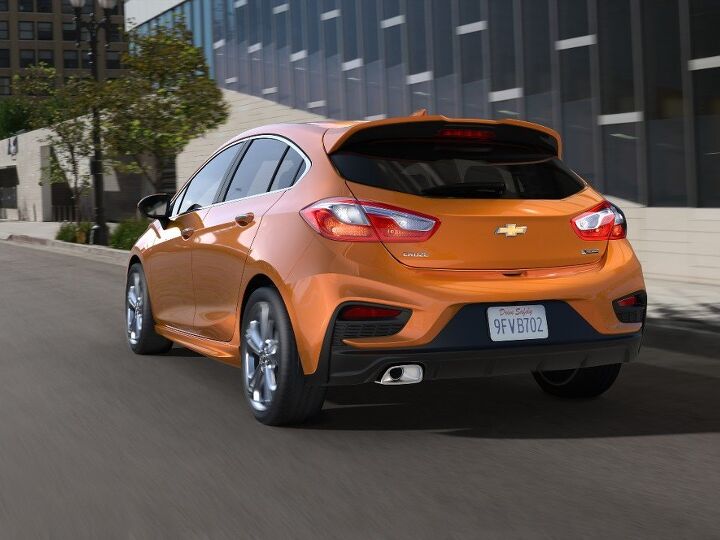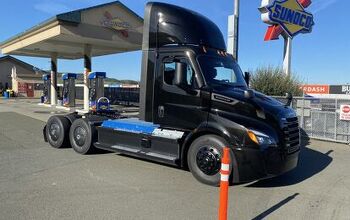Reports Claim GM Snipped Potential Lordstown/Chevrolet Cruze Lifeline

The president of a UAW local that represented General Motors workers at the now shuttered Lordstown Assembly plant isn’t happy knowing there was a chance that the mothballed facility could still be cranking out Chevrolet Cruzes.
Dave Green, president of UAW Local 1112, responded to reports in the Detroit Free Press and Youngstown Vindicator that a dealership mogul floated a plan to GM brass to purchase a massive order of Cruzes, thus allowing the plant to continue operating.
“If that deal was true, it could have kept 3,000 people working in Lordstown, plus all the parts suppliers on the side,” Green told Freep.
Word of the attempted purchase first appeared in the Vindicator, which reported that a Cleveland businessman, Bernie Moreno, offered to purchase thousands of Cruzes from GM for a period of five years — enough vehicles that Lordstown could have added a second shift. (The plant started Cruze production with three shifts, but declining volume meant it ended life with just one.)
Lordstown was one of five North American plants on the chopping block under GM’s streamlining plan. It built its last Cruze earlier this month, turning out the lights two days later.
When contacted by the Vindicator, Green said he was made aware of Moreno’s plan to create an international ride-hailing service, with all of the vehicles owned by the company. All drivers would be on staff. Moreno currently owns a dozen dealerships selling high-end import brands, plus Buick and GMC.
“Green was told about the financials, including arrangements with banks and the participation of a major automotive company,” the newspaper stated. When contacted, Moreno said a nondisclosure agreement prevented him from saying anything.
The Free Press dug into its own sources, with its contacts claiming the proposed deal, floated in December (after GM’s announcement of the plant idling), encompassed 150,000 to 180,000 Cruzes.
GM spokesman Dan Flores responded to both papers, telling Freep, “We would consider any [inquiries] that are truly viable business opportunities. To be clear, under the terms of the UAW-GM National Agreement, the ultimate future of the unallocated plants will be resolved between GM and the UAW.”
Is that a hint that Moreno’s alleged plan was built on shaky financial footings, or just noncommittal language? Speaking to the Vindicator, Flores said, “GM leadership took into consideration a variety of market factors when we made the product and manufacturing-related decisions announced last November 26th. The decision to discontinue the Cruze was made in response to market-related declines in customer demand for passenger cars. We don’t believe this segment is viable for us.”
Even with Mexican-built hatchbacks joining the Cruze family, U.S. sales volume shrunk from 258,185 vehicles in 2012 to 142,618 in 2018. While the alleged plan, if executed properly, might have staved off Lordstown’s unallocated status, ride-hailing operations are a risky business — even with driver-owned vehicles. Both Uber and Lyft are gearing up for IPOs in 2019, eager to reap a windfall from their public offerings.
[Image: General Motors]

More by Steph Willems
Latest Car Reviews
Read moreLatest Product Reviews
Read moreRecent Comments
- Corey Lewis It's not competitive against others in the class, as my review discussed. https://www.thetruthaboutcars.com/cars/chevrolet/rental-review-the-2023-chevrolet-malibu-last-domestic-midsize-standing-44502760
- Turbo Is Black Magic My wife had one of these back in 06, did a ton of work to it… supercharger, full exhaust, full suspension.. it was a blast to drive even though it was still hilariously slow. Great for drive in nights, open the hatch fold the seats flat and just relax.Also this thing is a great example of how far we have come in crash safety even since just 2005… go look at these old crash tests now and I cringe at what a modern electric tank would do to this thing.
- MaintenanceCosts Whenever the topic of the xB comes up…Me: "The style is fun. The combination of the box shape and the aggressive detailing is very JDM."Wife: "Those are ghetto."Me: "They're smaller than a Corolla outside and have the space of a RAV4 inside."Wife: "Those are ghetto."Me: "They're kind of fun to drive with a stick."Wife: "Those are ghetto."It's one of a few cars (including its fellow box, the Ford Flex) on which we will just never see eye to eye.
- Oberkanone The alternative is a more expensive SUV. Yes, it will be missed.
- Ajla I did like this one.



































Comments
Join the conversation
Am I missing something here? " create an international ride-hailing service, with all of the vehicles owned by the company. All drivers would be on staff." So, a service, with company owned vehicles, that picks people up when they call (or wave from the side of the road, or use an app), and salaried employees. Isn't that a TAXI service? I mean, we do have those already. Not an international one, I don't think, but, yeah.
I posted about this a few days ago. As I said then, if it were true, this is a missed opportunity. But it seems a bit sketchy, especially with the timing (right after the unallocation announcement). GM was right to pass on this. I have to imagine that it's critical to be the first mover in this new "taxi" service. Because, that's exactly what the guy was describing. But, if this is truly a viable operation, why not approach another manufacturer? I'm sure FCA or Ford or Nissan or somebody would not pass up a chance to sell potentially hundreds of thousands of sedans for the next several years, correct?